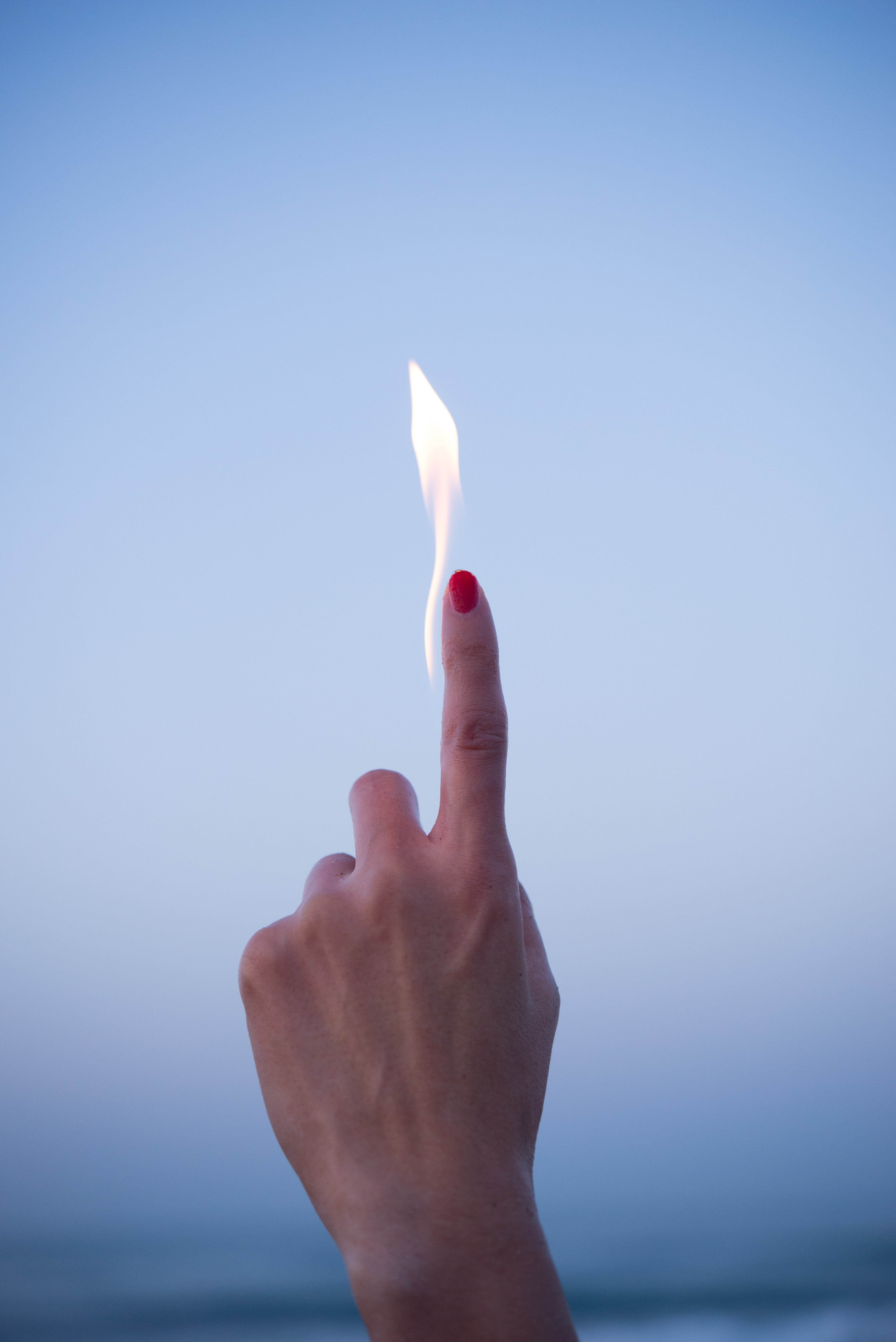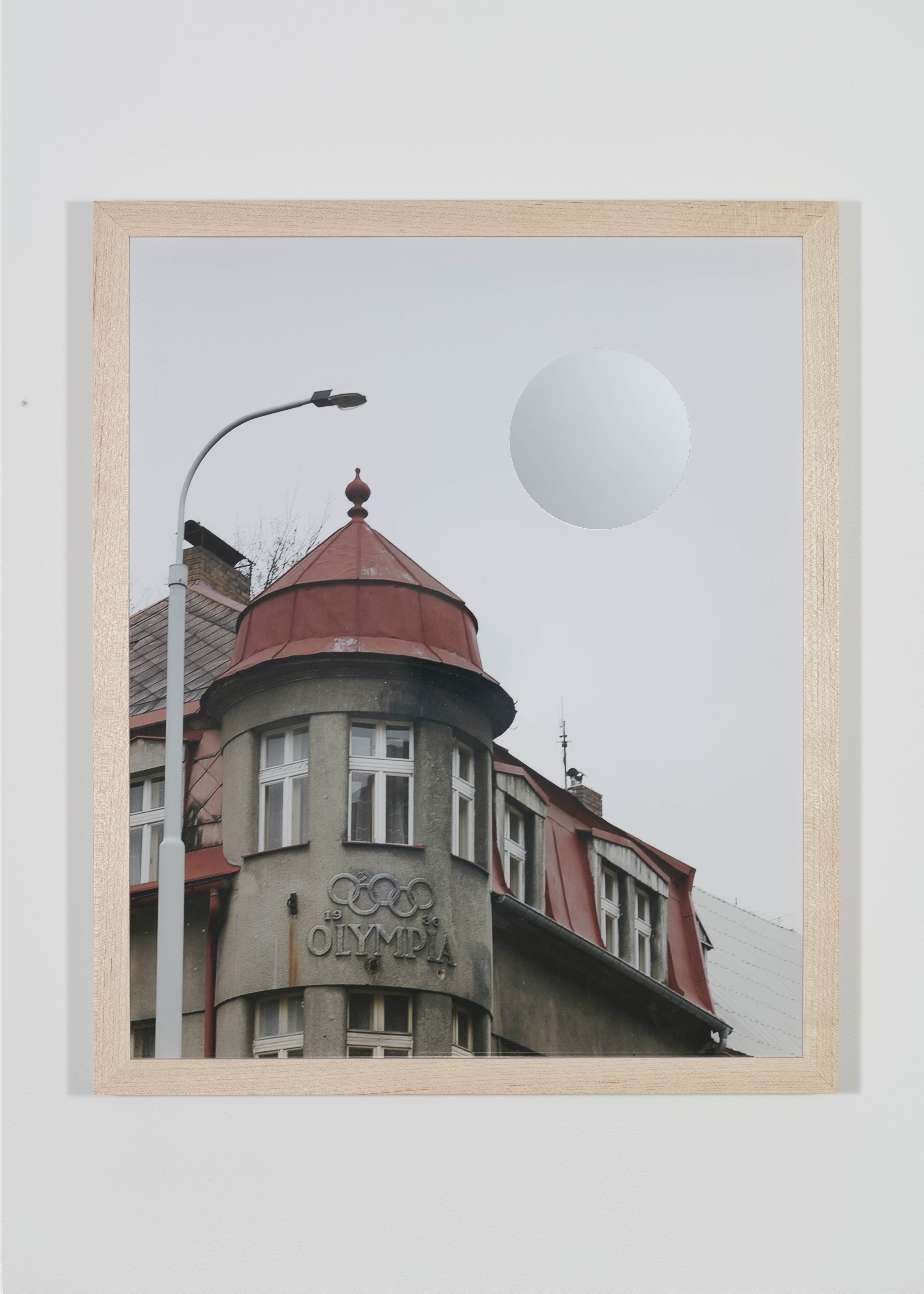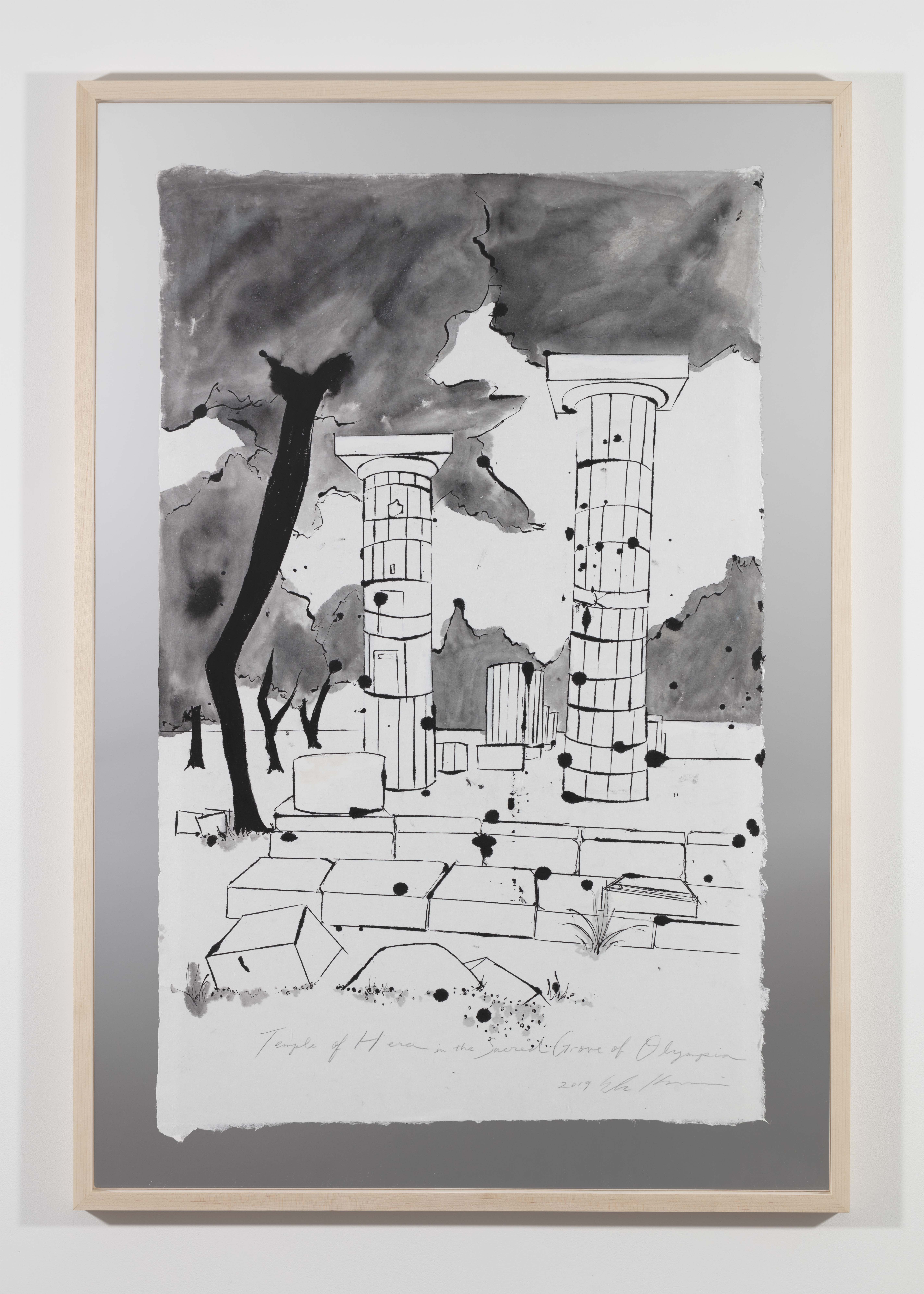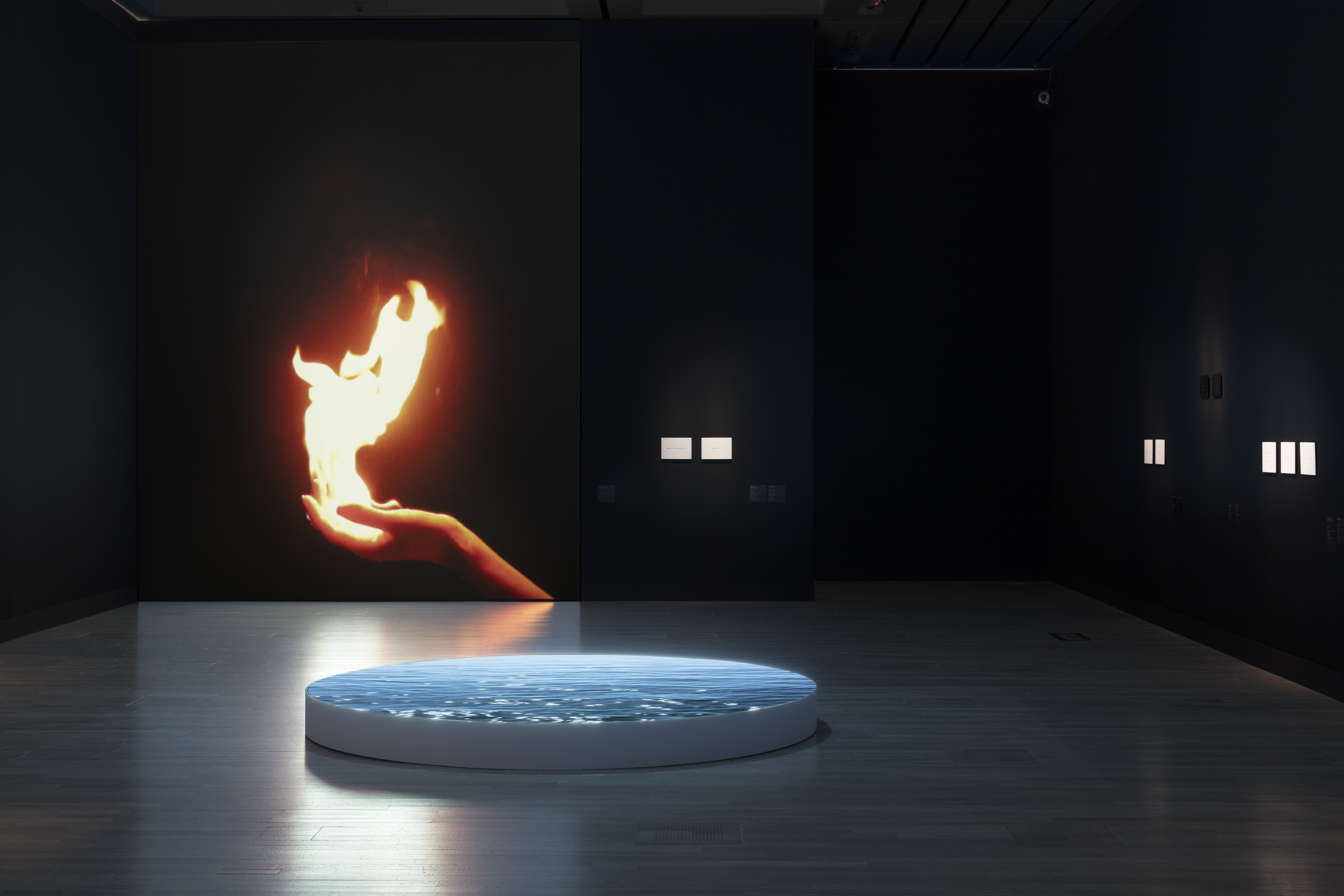 My Torch, 2019, C-print 54.9×36.7cm (each, set of 47), Collection of the artist ©Erika Kobayashi Courtesy of Yutaka Kikutake Gallery Photo: Kasane Nogawa
My Torch, 2019, C-print 54.9×36.7cm (each, set of 47), Collection of the artist ©Erika Kobayashi Courtesy of Yutaka Kikutake Gallery Photo: Kasane Nogawa “OLYMPIA 1936” Silver Road and the Olympics, Sankt Joachimsthal, Bohemia
“OLYMPIA 1936” Silver Road and the Olympics, Sankt Joachimsthal, Bohemia35.6×43.2 cm φ9.2 cm
 ““The eternal source dedicated to the highest.”Temple of Hera in the Sacred Grove of Olympia.”Ink, Japanese ink, Japanese paper, mirror 95.0×60.0 cm
““The eternal source dedicated to the highest.”Temple of Hera in the Sacred Grove of Olympia.”Ink, Japanese ink, Japanese paper, mirror 95.0×60.0 cm “Dollar” Uranium glass, mirror, ultraviolet lamp, 2017 Cooperation: Fairywood Glass Museum
“Dollar” Uranium glass, mirror, ultraviolet lamp, 2017 Cooperation: Fairywood Glass Museum “Her” Pencil, ink, Japanese ink, cotton paper 56.0×45.7 cm“Ex Occidente Lux“Spray paint, mirror 56.0×140.0 cm Cooperation: Yuka Sawabe
“Her” Pencil, ink, Japanese ink, cotton paper 56.0×45.7 cm“Ex Occidente Lux“Spray paint, mirror 56.0×140.0 cm Cooperation: Yuka Sawabe
“Her” Pencil, ink, Japanese ink, cotton paper 56.0×45.7 cm

“Her” Pencil, ink, Japanese ink, cotton paper 56.0×45.7 cm
 “3 Coures Maps The Planned Course for the Tokyo Olympic Games Torch Relay: Olympia -Tokyo, 1940” Acrylic paint, ink, canvas, LED 45.5×27.3 cm
“3 Coures Maps The Planned Course for the Tokyo Olympic Games Torch Relay: Olympia -Tokyo, 1940” Acrylic paint, ink, canvas, LED 45.5×27.3 cm
| “My Torch” |
Photo: Kasane Nogawa
 “U234 and U235 at Kiel” video
“U234 and U235 at Kiel” video In My Hand— The Fire of Prometheus
In My Hand— The Fire of Prometheus Video: Akiko Nishimura, Yoichi Takanashi
“Image Narratives: Literature in Japanese Contemporary Art”, 2019, The National Art Center, Tokyo, Installation View, Photo: Shu Nakagawa
Group Exhibition
“話しているのは誰? 現代美術に潜む文学”
国立新美術館
“Image Narratives: Literature in Japanese Contemporary Art”
THE NATIONAL ART CENTER, TOKYO
August 28-November 11, 2019
with works by
Erika Kobayashi
Futoshi Miyagi
Keizo Kitajima
Yamashiro Chikako
Yasuko Toyoshima
Yuichiro Tamura
Curated by Naoki Yoneda
Group Exhibition
“OMOSHIROGARA“
Museum DKM
October1, 2021– September 4, 2022.
with works by
Erika Kobayashi
Jong Ok Ri
Kei Takemura
Yu Araki
Yuichiro Tamura
Curated by Roger M. Buergel, Miwa Negoro and Marika Mikami
彼女たちは待っていた
1936年
丘の上の教会から「銀の道」がまっすぐのびる小さな町のただなかで
彼女たちは見あげている
赤い丸屋根の建物の石壁には梯子がかけられ
いままさに、オリンピックのエンブレムが刻まれようとしているのだった
五つの輪とOLYMPIAの文字の間に添えられた年号は1936年
ここはチェコスロバキア、旧ボヘミア地方、聖ヨアヒムの谷である
彼女たちは待っていた
オリンピックを
聖火がこの町へやってきてくれるのを
炎が、光が、あたりを明るく照らしてくれるのを
この細い道が「銀の道」と呼ばれるのには理由がある
16世紀、聖ヨアヒムの谷の地底からは、銀が出た
一攫千金をあてようと、ドイツ、ザクセン地方から
5000人ばかりの男たちがやってきて、地面を掘った
銀は次々銀貨に鋳造されて、ボヘミアじゅうへ広がった
その名は、ヨアヒムスターラー、略称ターラー
後に新世界アメリカへまで渡り、ダラー、ドルの語源になった
炎を手にしたものたちが、闇の中へと降りてゆく
地底を掘り進んでゆく
ところが、やがて掘っても掘っても銀が出なくなる
かわりに出るのは、黒光りする石ばかり
そのうえ坑夫の男たちの間に、原因不明の奇病が蔓延する
身体がだるい、血が止まらない
男たちは黒光りするその石を、ドイツ語でピッチブレンド(ピッチは黒い/不幸の、ブレンドは鉱石)、「不幸の石」と呼んで忌み嫌った
18世紀、「不幸の石」の中からは、新しい元素が発見された
その名は、天王星ウラヌスにちなんで、ウラン
ウランはガラスに混ぜると、紫外線の光で蛍光グリーンに輝いた
ウランガラスはヨーロッパじゅうへ広がった
貴族たちにもてはやされ、ワイングラス、花瓶、ネックレス、
眼球洗浄器までつくられた
ギリシア神話、天空の神ウラヌス
大地の女神ガイアが、だれとも交わることなく身ごもり
生んだ子ども
ガイアは自らの子ウラヌスと交わる
ふたりが交わるたびにこの世界には夜が訪れる
彼女たちが壁に刻まれたオリンピックのエンブレムを見あげていたころ
ギリシア、オリンピアの神殿跡には、
白い衣装を纏った11人の処女が集められていた
儀式では、その女たちが鏡で太陽の光を集めることになる
7月20日、いままさに、世界ではじめての聖火リレーが
はじまろうとしていた
炎が甦り、聖火リレーのトーチに灯される
ギリシア神話の神、プロメテウスが盗み出し、人間に与えた太陽の火
ギリシア、オリンピアの地から、遥かドイツ、ベルリン—アドルフ・ヒトラー率いるナチ・ドイツのベルリンのオリンピック開会式スタジアムへ
日数は12日間。ランナーの数は3308人
炎は男たちの手から手へと渡され、運ばれてゆく
彼女たちは待っていた
聖火がこの町へやってきてくれるのを
炎が、光が、あたりを明るく照らしてくれるのを
7月31日午前1時、聖火はプラハへやってくる
それから、4時30分ストラシュコフ、6時15分テレジン、9時にテプリツェを通過する
けれど、聖火はここへは届かない
1938年
ベルリンオリンピックから2年後
聖火リレーのルートを遡るようにして、
ナチ・ドイツの軍隊が侵攻していた
トーチとおなじクルップ社製の戦車に乗って、
炎で人間を焼き払いながら
聖火がやってこなかったこの町へも、
ナチ・ドイツの軍隊はやってきた
炎を手にしたものたちが、闇の中へと降りてゆく
地底を掘り進んでゆく
坑夫たちのかわりに、この町へ連れてこられた
戦争捕虜の男たちが「不幸の石」を掘る
震災からの復興を遂げ、真新しいビルが立ち並ぶ
大きな街のただなかで
彼女たちは見あげている
いままさに、日の丸の国旗とオリンピックエンブレム旗が見わたすかぎりに掲げられ、いっせいにたなびいているのだった
金色で富士山と五つの輪があしらわれたポスターのTOKYOの文字の横に添えられた年号は1940年
神武天皇の即位から2600年、紀元二千六百年祭の年
ここは、大日本帝国、帝都東京である
彼女たちは待っていた
オリンピックを
聖火がこの町へやってきてくれるのを
炎が、光が、あたりを明るく照らしてくれるのを
1940年
ベルリンオリンピックから4年後
ギリシア、オリンピアの聖火、プロメテウスの火は、今度は遥か東、大日本帝国帝都東京、オリンピック開会式スタジアムへ
運ばれることになる
壮大な聖火リレー計画がぶちあげられる
ギリシア、オリンピアから、アテネ、イスタンブール、アンカラ、テヘラン、カブール、ペシャワール、デリー、カルカッタ、ハノイ、広東、天津、ソウル、釜山
炎は人と騎馬により、ユーラシア大陸を横断し、
男たちの手から手へと渡され、日出ずる国へ届くのだ
ラテン語の諺「光は東方から」は「光は西方から」へと、
変わることになるだろう
彼女たちはたなびく日の丸の国旗を見あげていたが、
そこには、オリンピックエンブレム旗はもはやなかった
紀元二千六百年祭の花車だけが通り過ぎてゆく
11月10日、電力調整令のおかげで明かりの消えた薄暗い街で
彼女たちは待っていた
オリンピックを
聖火がこの町へやってきてくれるのを
炎が、光が、あたりを明るく照らしてくれるのを
けれど、オリンピックは開催されない
男たちは戦場へ出かけていった
けれど、聖火はここへは届かない
1941年
開催されることのなかった東京オリンピックから1年後
大日本帝国の軍隊は、実現することのなかった聖火リレーのルートを遡るだけでなく、東方へも向かっていった
騎馬のかわりに爆撃機に乗って、炎で人間を焼き払いながら
大日本帝国の軍隊が、アメリカ、ハワイの真珠湾を爆撃していた
二度目の世界大戦がはじまっていた
炎を手にしたものたちが、闇の中へと降りてゆく
地底を掘り進んでゆく
ウランの原子核が分裂することが発見されていた
そのエネルギーを使えば、いまだかつてないほど強大な力を持つ爆弾、つまり原子爆弾を造ることができるかもしれない
爆弾を造るために必要なウラン235は、約10キログラム
大日本帝国陸軍と理化学研究所の男たちによる、
極秘の原子爆弾開発計画「ニ号研究」がはじまっていた
ナチ・ドイツから同盟国の大日本帝国へ向けて、
壮大なウラン搬送計画がぶちあげられる
聖ヨアヒムの谷の「不幸の石」は列車でベルリン郊外へ運ばれ、
工場でウランを抽出した後、ドイツ、キール港へ
ウランは男たちの手から手へと渡され、潜水艦で大西洋の海底を進み、日出ずる国へ届くのだ
1945年
かつてベルリンオリンピックの聖火が灯され、ヨットレースが行われたキールの港は、炎で明るく燃えていた
海軍基地、市庁舎、セント・ニコライ教会、オペラハウスが、焼けていた
港のブンカーに停泊しているのは、潜水艦Uボート。通称、灰色の狼
47個の茶色い包みが、ウランが積み込まれる
Uボートの番号は、奇しくもウラン235と1番違いのU234
ナチ・ドイツの男たちと一緒に、大日本帝国の男たちふたりも艦に乗り込んだ
ウランは、運ばれてゆく
彼女たちは待っていた
オリンピックも、聖火もやってこなかったこの東京の街で、
暗い空を見あげながら
噂話だけが何度も繰り返される
いま、この国の科学者の男たちは、いまだかつてないほど
強大な力を持つ、ウラン爆弾という爆弾を造っているらしい
マッチ箱ひとつの大きさでニューヨークの街が吹き飛ぶらしい
炎を手にしたものたちが、闇の中へと降りてゆく
海底を、ウランを積んだ潜水艦が進んでゆく
大西洋を南下している途中、報せが暗号文で届けられる
ナチ・ドイツ無条件降伏
けれどドイツは降伏したかもしれないが、大日本帝国は
未だ降伏していない
ふたりの大日本帝国の男たちが流暢なドイツ語で主張する
このウランがあれば、ウラン爆弾を造ることができるのだから
ウラン爆弾さえ完成すれば、戦争にだって、勝てるだろう
投下目的地はサイパン
サイパンを爆破すれば飛行距離は長くなるから、本土空襲は免れることができるから
しかし艦はアメリカに投降することに決まった
ふたりの大日本帝国の男たちはルミナールをのみほし、
ベッドの上で重なり合うようにして不穏な鼾をかいていた
白いシーツがディーゼルエンジン用の重油に浸され、
黒く染めあげられる
投降を意味する黒旗が、浮上した潜水艦の潜望鏡に掲げられる
ふたりの男たちの遺体は、夜の海底へと沈んでゆく
彼女たちは待っていた
いまや、東京の街も、炎で明るく燃えていた
本土空襲がはじまっていた
彼女たちは待っていた
けれど、ウランはここへは届かない
爆弾は完成しない
あれほど待ち望んだその爆弾は、できるよりさきに、
落とされることになる
その名は、リトルボーイとファットマン
炎が人間を焼き払いながら、光があたりを明るく照らす
戦争が終わる
彼女たちの人生は終わらない
炎を手にしたものたちが、闇の中へと降りてゆく
She Waited
1936
There, in the little town where the narrow Silberstraße ran
straight through, starting at the church on the hill,
she looked up.
A ladder leaned against the stone wall beneath the red domed roof of a building
where the Olympic emblem was being carved into the stone:
five rings and the word OLYMPIA, and between them the date:
1936.
This was Czechoslovakia, formerly Bohemia,
a place called Sankt Joachimsthal—Saint Joachim’s Valley.
She waited—
for the Olympics
for the sacred fire to come to her little town,
for the fire, for its light, to illuminate her little town.
There’s a reason this narrow road is called the Silberstraße.
In the 16th Century, in Saint Joachim’s Valley, silver first emerged—
over 5000 men arrived, ready to get rich quick—
from Saxony, in Germany—
they came and dug deep into the earth.
The silver was minted into coins that spread all across Bohemia,
coins called Joachimsthalers,or thalers for short.
They eventually reached even the New World, as dollars—
for this is the origin of the dollar.
Torch in hand, men descended into darkness,
excavating deep into the earth,
but as they dug, less and less silver emerged
replaced by more and more mysterious shiny black stone.
Among the men, a mysterious disease began to spread—
their bodies grew sluggish and would bleed without stopping—
and so they began to call the shiny black stone pitchblende,
German for accursed stone.
In the 18th Century, a new element was discovered within this accursed stone.
It was given the name uranium, after the planet Uranus.
When uranium is mixed with glass, it glows fluorescent green under ultraviolet light.
Soon uranium glass spread all throughout Europe.
It was prized by the aristocracy, made into wine glasses, vases, necklaces,
even instruments for irrigating the eye.
According to Greek myth, Uranus, the sky god,
was born to the earth goddess Gaia despite her virginity,
and when mother and son made love,
the world was visited by darkness.
At the same time she was looking up at the Olympic emblem being carved into the wall,
eleven virgins had gathered
in Greece, at the ruins of the Temple of Olympia,
all dressed in white.
During the ceremony, the virgins gathered the light of the sun using mirrors.
It was July 20th, the first time the sacred fire relay took place.
The flame was resurrected, the sacred fire passed from torch to torch—
the fire stolen from the sun and given to humanity by Prometheus—
from Greece, the Land of Olympia, to Berlin, in Nazi Germany—
to the Olympic Stadium, where the Opening Ceremony took place, led by Adolf Hitler.
It took twelve days to make the journey.
3308 runners carried the torch,
the flame passing hand to hand, bringing its light.
And she waited—
for the sacred fire to come to her little town,
for the fire, for its light, to illuminate her little town.
Finally, at one in the morning on July 31st, the sacred fire reached Prague,
and then at 4:30am reached Straskov, then Terezín at 6:15, then Teplice at 9—
but the sacred fire never reached the little town.
1938
It was two years after the Berlin Olympics.
The Nazi army invaded the area as if following the sacred fire’s path,
their tanks made by Krupp, the same company that manufactured the torch itself—
the flames burned all in their path to ashes.
The Nazi army arrived in the little town the sacred fire never reached.
Torch in hand, men descended into darkness
excavating deep into the earth,
but instead of miners, now it was prisoners of war brought by the Nazis who mined the accursed stone.
In the center of a big city filled with brand new buildings
thrown up under the banner of reconstruction following an earthquake’s devastation,
she looked up.
Flags with red suns in their center joined flags bearing the Olympic emblem,
flying as far as the eye could see.
On the posters showing Mount Fuji and the Olympic rings in gold,
letters spelling TOKYO were set beside numbers spelling out the year:
1940.
It was the 2600th Anniversary of the Founding of Japan,
and this was Tokyo, the Imperial Capital of the Empire of Japan.
She waited—
for the Olympics
for the sacred fire to come to her city,
for the fire, for its light, to illuminate everything around her.
1940
It was four years after the Berlin Olympics.
The fire of Olympia, Prometheus’ gift, was to be borne from Greece this time to the Far East,
to the stadium where the Opening Ceremony would occur in Tokyo,
the capital of the Japanese Empire.
It was to be a grand Olympic relay to bring the sacred fire from
Olympia to Athens, then Istanbul, Ankara, Tehran, Kabul, Peshawar, Delhi, Kolkata, Hanoi,
Guangdong, Tianjin, Seoul, Busan....
The flame was to be borne by men on foot and horseback,
its light crossing Eurasia eastward hand to hand until it reached the Land of the Rising Sun.
Would the Latin phrase ex oriente lux end up being changed to ex occidente lux?
She looked up at the flags with suns in their centers,
but they were no longer accompanied by those with the Olympic emblem.
All that passed by her were parade floats for the 2600th Anniversary of the Founding of Japan.
It was November 10th.
The streets were dim, the lights shut off by government decree to conserve power.
She waited—
for the Olympics
for the sacred fire to come to her city,
for the fire, for its light, to illuminate everything around her.
But the Olympics were never held,
all the men were sent to the battlefield,
and the sacred fire never reached her.
1941
It was one year after the Tokyo Olympics failed to happen.
The Japanese Imperial Army not only retraced the path of the torch relay that was never run,
but went east as well,
borne by bombers rather than horses, flames burning all in their path to ashes,
attacking America, bombing Pearl Harbor in Hawaii:
the Second World War had begun.
Torch in hand, men descended into darkness
excavating deep into the earth.
The nuclei of uranium atoms could now be split,
and the energy produced could create the greatest bombs the world had ever seen—
bombs that we now call nuclear weapons:
10 kilograms of uranium 235 were needed to make one.
A top secret nuclear weapon development plan called the Ni-Go Research Project was begun,
a collaboration between physicists at the National Institute of Physical and Chemical Research and the Japanese Imperial Army.
A plan was hatched to transport large amounts of uranium
from Nazi Germany to its ally, the Japanese Empire.
Accursed stone was transported by rail from Saint Joachim’s Valley to the outskirts of Berlin,
where uranium was extracted from it and taken to Kiel Bay—
passed hand to hand, it was placed in a submarine to be transported along the Atlantic Ocean floor,
bound for the Land of the Rising Sun.
1945
Kiel’s Bay, where the yacht races of the Berlin Olympics had been held,
back when the sacred fire illuminated the nation,
was once more illuminated by flames.
The naval base, the town hall, the church of Saint Nikolai, the opera house—all were on fire.
The submarines known as U-boats were anchored in the Bay. They were called Grey Wolves.
One bore 47 brown packages of uranium.
The U-boat’s number was only one off from that of the uranium within it: U-234.
Two men from the Empire of Japan accompanied the men from Nazi Germany on the U-boat
to take the uranium east.
She waited.
In the streets of Tokyo, where the Olympics had failed to come,
where the sacred fire had failed to reach,
she looked up at the dark sky.
Rumors repeated:
the scientists of this great country were making a bomb more powerful than any ever seen before,
a bomb called a uranium bomb—
a matchbox-sized piece would be enough to bathe the streets of New York in flames.
Torch in hand, men descended into darkness.
Bearing its uranium cargo, the U-boat crossed the ocean floor.
As it headed south across the Atlantic, a coded message was received:
Nazi Germany had unconditionally surrendered.
But even if Germany had fallen, the Empire of Japan had not!
The two Japanese men onboard the submarine insisted in fluent German—
If this uranium is delivered, the bomb can be created—
it can be created and used and the war can still be won!
The target would be Saipan—
if Saipan were taken out, the distance would be too great for the Allied planes
and land war would be avoided!
But it was decided to surrender the submarine to the Americans
and the two Japanese men swallowed Luminal,
collapsing into a heap on a bed, snoring unnaturally,
the white bedsheets soaked in black diesel.
The black flags announcing defeat were hung from the periscope once the U-boat had surfaced
while the bodies of the Japanese men sank to the floor of night-dark sea.
She waited.
The Tokyo streets were now illuminated, bathed in flames.
The air raids of the land war had begun.
And she waited—
but the uranium failed to reach her,
and the bomb was never completed.
The bomb she’d so anticipated ended up dropped on Japan instead—
bombs named Little Boy and Fat Man,
illuminating everything around them as they burned everyone to ashes.
The war ended,
but her life, their lives, did not.
Torch in hand, men descended into darkness.
Translated by Brian Bergstrom
“She Waited” in Chic Magazine
JP https://chic-magazine.jp/blog/8584/
EN https://chic-magazine.jp/en/blog/8584/